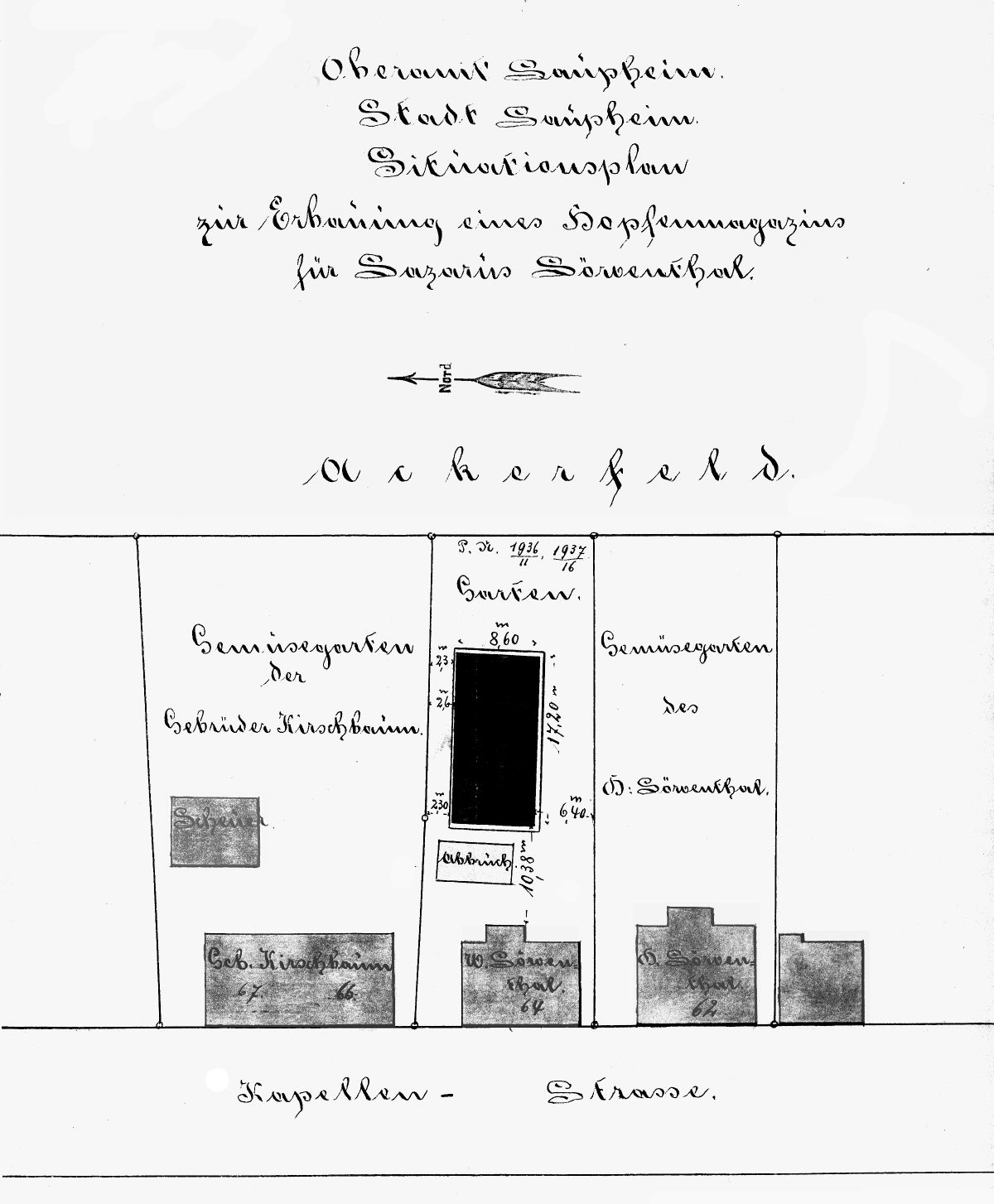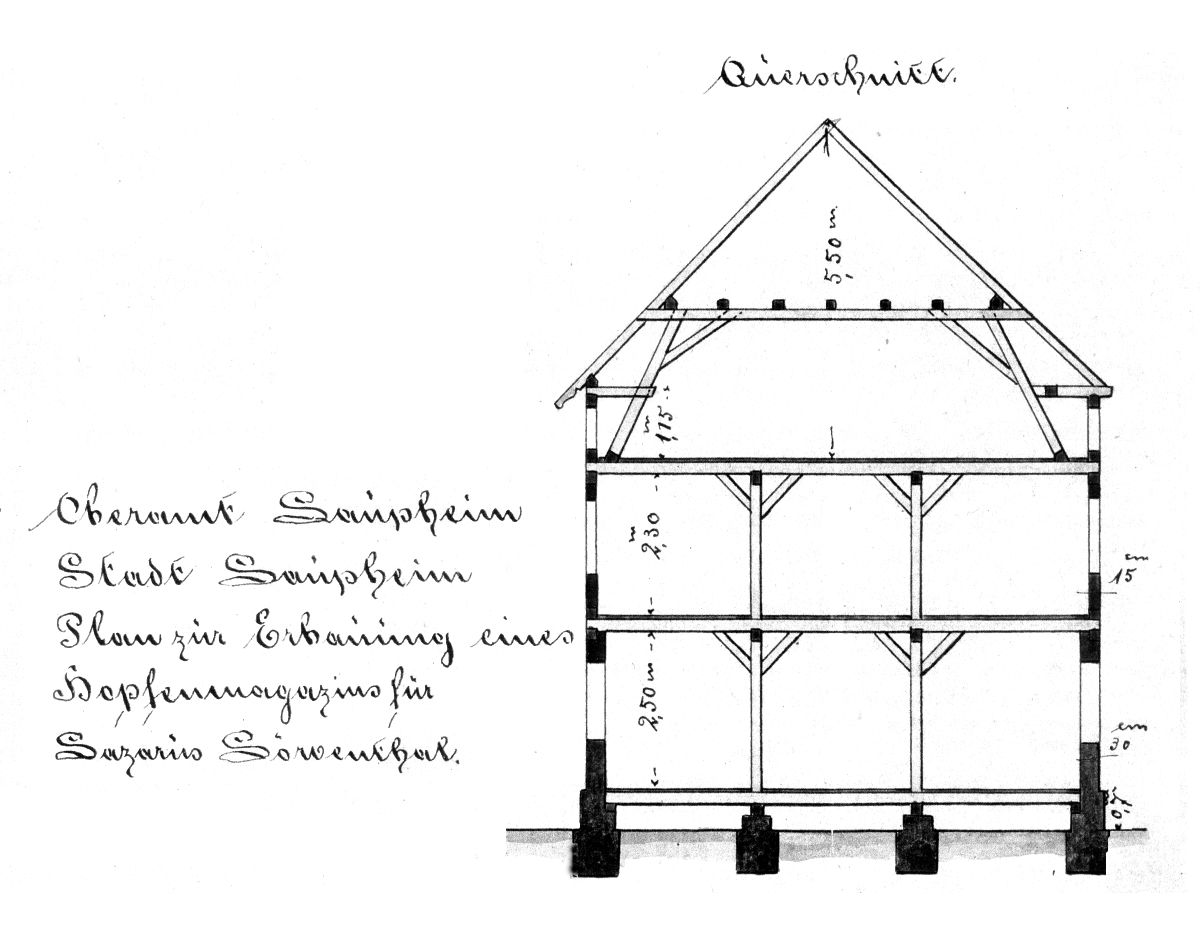 LÖWENTHAL,
Lazarus,
LÖWENTHAL,
Lazarus,
The Jewish
Community
of
La
Book Pages 369 - 372
 Hops dealer, 64 Kapellenstrasse
Hops dealer, 64 Kapellenstrasse
Translated by: Clara Steiner-Jay
ROBER T
E ß
[Lazarus Löwenthal, born August 6, 1843 in Laupheim OO suicide on November 20, 1901 in Laupheim]
Leopoldine (Lina), née Löwenthal, born October 10, 1851 in Laupheim, died September 19, 1941 in Laupheim
– Hermine, married Strauß born July 24, 1872 in Laupheim
– Elise, married Friedberger, born May 2nd, 1876 in Laupheim, murdered May 16, 1944 in Auschwitz
Lazarus Löwenthal
was the 8th of 14
Kindern and a son of the hops
dealer Wolf
Löwenthal. In 1871 he married
Leopoldine
Löwenthal, the daughter of his uncle Nathan,
also a hops dealer and a
co-owner of M. Löwenthal and son in Laupheim.
In 1877 the grandfather Marx
Löwenthal had built the large property in the 65
Kapellenstraße .
Mathilde Löwenthal, who was four years
older than her sister Leopoldine,
married the hops dealer Ludwig
„Louis“
Löwenthal, also a co-owner of M.
Löwenthal and son. A third sister,
Rosalie married
Salomon Löwenthal, another
hops dealer and brother of Ludwig
„Louis“.
Uncle Nathan Löwenthal had 11 children, and 3 of his daughters were married to sons of his brothers. „Apparently (as said John H. Bergmann) without any genetic judgement, but instead it kept the family assets together.“
1)
Wolf Löwenthal (1805-1892)
had built a house in the Kapellenstraße 64. His son
Lazarus
bought a share Ackeranteil adjacent to the property from
Anton Brunnenhuber and
in 1883
he built a large hops warehouse that still exists to this day.
It was designed by Oberamtsbaumeister
Werkmann.
The hops dealing was thriving. In Laupheim „there were five hops businesses in 1897: S. H. Steiner, Louis and Lazarus Löwenthal, Louis Regensteiner and Max Sundheimer“.
2)
There was a lot of competition, and the business of
Lazarus
Löwenthal ran into economic
difficulties. He was threatened with a
foreclosure auction of his property.
On November 20, 1901, three
days before the court date, he committed suicide.


Letterhead of Marx Löwenthal
(Archive: Michael Schick)
Nathanja Hüttenmeister commented
this as follows: „Lazarus,
whose Jewish name is registered in the death registry as Elieser,
son of Benjamin,
was ,found dead’
and was buried two days later. The
entry of the cause of death
in the death registry
has an addition in Hebrew,
which says that
Lazarus
committed suicide.“3)
From the subsequent
bancruptcy proceedings
Berthold Friedberger,
the son-in-law who had just recently married
Lazarus’ daughter Elise, acquired the house with the hops warehouse
on March 1st, 1902.
The couple later moved to Radstraße 25 and again auctioned
off the property in the
Kapellenstraße
64. The Jewish horse
dealer Emanuel Kahn,
called Emil, a well-respected business man in
Laupheim
(see page 312), received the
winning bid.
After Crystal Night (Reichspogromnacht) of November 9 to 10, 1938 he was taken to the concentration camp
in Dachau at the order of the Gestapo, together with
16 Jewish businesspeople.
Released from “preventive custody”
(„Schutzhaft”),
he sold his property in the same year: 50
percent to
Peter
Wassermann of Memmingen, and 50
percent to Josef
Rebholz of Memmingen, later
Laupheim.
In 1943 the purchase contract was
reissued again after previous
restitution of the estate.
After the suicide of her husband
Lazarus
and the foreclosure auction in
1902,
Leopoldine
(Lina) Löwenthal moved to the
house of her father Nathan
Löwenthal (on the opposite side of the street), whose wife
Frederike,
née Mayer,
had died in 1894.
When Nathan
Löwenthal died on
February 16, 1905, his daughter
Lina, together with her five
sisters inherited the house in
the
Kapellenstraße 63. Her single sister
Jeanette, born on April 1st, 1862,
who was living there, was given the right to live in a corner room on
the upper floor.
In 1930, after the master baker
Kaspar
Fetzer
bought the house, the two sisters moved next door to the
Kapellenstraße 65. Jeanette died on
May 27, 1939 in
Laupheim,
and Lina, after 40 years of widowhood, died on September 19,
1941 in the nursing home
Heggbach, at 90 years old.
She was a modest woman. On the
occasion of her 80th birthday we can read in the Jewish community
newspaper:
„One of those increasingly rare dignified women,
whose religion and house, family
and community still formed
the core of her quietly modest
pious life!“4)
By their deaths, both sisters were spared the horrors of deportation.
The Children:
The couple
Lazarus
and Lina Löwenthal had two
daughters:
Hermine,
married to Max Strauß, merchant in
Bruchsal. (Her whereabouts are unknown.)
Elise,
married to Berthold
Friedberger,
cattle dealer and city
counselor in the
24
Radstraße .
After the foreclosure of their
house and the death of her
husband in 1941, shortly before his
75th birthday,
Elise
Friedberger was moved to the
Wendelinsgrube.
On August 19,
1942 she was deported
with the last, the fourth
deportation, first to the
concentration camp in
Theresienstadt and from there, on May 6, 1944 on a liquidation transport
to Auschwitz where she was murdered.
(See Berthold
Friedberger family starting on
Page
209.)
Sources:
1) Letter from 20.12.1987
to Henry
Lowen,
Denver.
2) Josef K.
Braun, „Altlaupheimer Bilderbogen“,
Vol. II,
page 168.
3) „Der Jüdische
Friedhof
Laupheim“,
page 425,
Nathanja Nüttenmeister.
4) „"Der Jüdische
Friedhof
Laupheim“,
page 523
/ G/GW
13/1931, page 147.